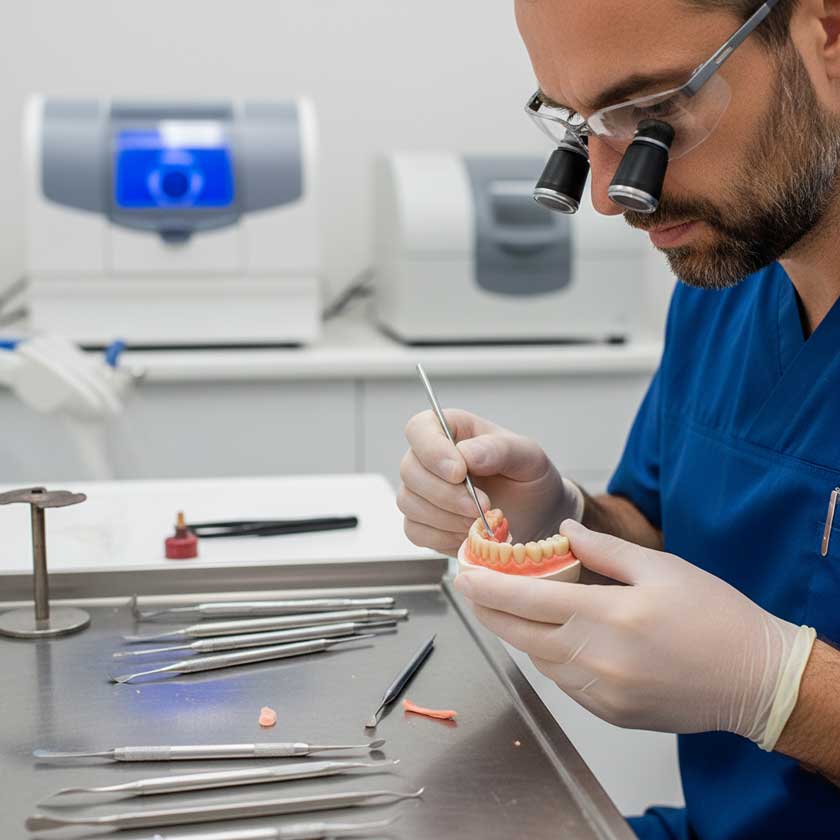From a lifetime of family denture expertise in the Treasure Valley
Hey there, I'm Josh Westerberg, and if you're reading this because your dentures feel too thick, I want you to know something right off the bat: you're not imagining it, and more importantly, we can fix it.
Growing up in my family's denture clinic here in the Treasure Valley, I've been around dentures my entire life. Over six decades of family legacy have taught me one thing above all else—when a patient tells me their dentures feel too thick, there's almost always a real solution waiting.
As a former Vice President of the Idaho Denturitry Association and someone who's spent the last decade perfecting denture care at what used to be Public Denture in Caldwell, I've seen just about every thickness problem you can imagine. And here's what I always tell my patients: most of these issues can be resolved with the right adjustments and a little patience.
Ready to get this fixed? Let's schedule your free consultation →

What "too thick" really means (And why I take it seriously)
When someone walks into our clinic and says "Josh, these dentures are too thick," I know exactly what they're experiencing. It's not just discomfort—it's affecting how they live their daily life.
Here's what I typically see:
The Physical Stuff:
- That constant bulky feeling in your mouth that never goes away
- Gagging, especially when you're trying to eat or even just talk
- Sore spots where the denture rubs against your cheeks or lips
- Your tongue feeling crowded, like there's just no room
The Functional Problems:
- Speech changes that make you sound different (and feel self-conscious)
- Difficulty eating foods you used to love
- Cheek or tongue biting because everything feels "off"
- Extra saliva that seems to never stop
The Emotional Impact (And This One Breaks My Heart):
- Avoiding social situations because you're embarrassed
- Not smiling as much as you used to
- Feeling older than you are
- Losing confidence in everyday conversations
"All I can do is smile, smile, smile!!! Thanks to the New Smile clinic here in Caldwell, Idaho that is all I can do...SMILE!! I was so lucky to find Josh and even more lucky that he could make me beautiful again!!" - Selina Gonzales
That's from Selina, one of our patients who came to us after other dental clinics told her she needed expensive bone grafts and procedures she couldn't afford. We found a way to make it work, and now look at her—she can't stop smiling!
Experiencing these issues? Call us at (208) 454-0311 - I personally want to help you get this resolved.
Normal adjustment vs. "Josh, we need to fix this"
Let me be straight with you about what's normal and what isn't, because I see a lot of patients who've been told to "just get used to it" when they really shouldn't have to.
The first few weeks: What I expect to see
When you first get dentures, your mouth is learning how to work with something completely new. During this time, I tell all my patients to expect:
- Some speech changes (you might lisp a little at first)
- Extra saliva production (your mouth thinks there's food in there!)
- A feeling of fullness or mild bulk
- Some difficulty with certain foods
This is all normal adaptation stuff. Your mouth is smart—it will figure it out.
When I know we need to step in
But there are certain things that tell me we have a design or fit problem that isn't going to resolve on its own:
- Persistent gagging after a month - Your mouth shouldn't keep rejecting the denture
- Painful pressure spots that aren't improving - These should get better, not worse
- Complete inability to keep the dentures in - They should stay put with proper fit
- Speech problems that are getting worse - Should improve over time, not deteriorate
- Can't eat anything beyond soft foods after proper healing - You should be progressing
I've been doing this long enough to know the difference. If you're experiencing the second list, don't wait. Let's get you in here and figure out what's going on.
Schedule with me personally - Free consultation →

Why dentures feel too thick (The real science)
Okay, let me get a little technical for a minute, but I'll keep it simple. After decades in this business, I've learned that thickness problems usually come from one of several places:
Manufacturing issues
Research shows that thicker denture bases can actually cause teeth to shift during the manufacturing process. When this happens, the whole bite gets thrown off, and the denture feels bulky and unstable. It's like wearing shoes that are the wrong size—technically they're shoes, but they're not right for your feet.
Design trade-offs that don't work
Here's something a lot of denture makers get wrong: they think thicker automatically means stronger. But in my experience, over-bulking the palate or the flanges rarely adds useful strength. Instead, it just makes patients gag and feel uncomfortable.
Your mouth is always changing
This is something I explain to every patient: your mouth isn't static. After tooth extraction, your bone and soft tissue naturally change over time. Dentures that felt perfect six months ago might feel too thick today because your mouth has evolved.
That's why, at New Smile Dentures, we offer free future fittings. Your mouth changes, so your dentures should change with it.
How I approach fixing thickness problems
Every patient who comes to see me gets the same thorough approach. I've refined this process over the years, and it works.
Step 1: Let's really understand what's going on
First, we sit down and talk. I want to hear exactly what you're experiencing, when it started, and what makes it better or worse. Then we do a complete evaluation:
- I take impressions to capture your exact bone structure using the highest quality materials we can get
- We analyze how your upper and lower jaws relate to each other
- I check for pressure points and areas of poor contact
- We test your speech patterns and see where the problems are happening
Step 2: Custom solutions, not one-size-fits-all
Here's where our in-house lab really shines. Because we do everything right here in Caldwell and Boise, I can make precise adjustments that address your specific problems:
Selective Thinning: I can reduce bulk in specific areas without compromising the strength where you need it. The palate might need thinning near the front for tongue space, but we keep thickness where it's needed for retention.
Border Adjustments: Those flanges along your cheeks and lips? We can contour them perfectly so they don't impinge on your muscles or create sore spots.
Bite Refinement: If processing shifted your teeth, we can remount everything and get your bite exactly where it needs to be.
Step 3: Follow-through (Because I care about your long-term success)
Once we place your dentures, I provide any necessary adjustments at no extra cost. That's not a marketing gimmick—that's my commitment to you. If something isn't right, we fix it until it is right.
And here's something I'm particularly proud of: we offer free future fittings. As your mouth changes over time, we'll keep your dentures comfortable. It's part of treating our patients like family.
Want to see what this personalized approach can do for you?
Book your free consultation today →
Getting back to eating what you love: My 4-week plan
One of the most heartbreaking things I see is patients who've given up on foods they used to enjoy. You shouldn't have to live on soup and applesauce forever. Here's the eating plan I give every patient:
Week 1: Building your foundation
Start with soft, moist foods that don't require much chewing force:
- Soups and smoothies (great for nutrition and easy on new dentures)
- Scrambled eggs and mashed vegetables
- Soft fish and yogurt
- My tip: Cut everything into small pieces and chew on both sides
Week 2-3: Expanding your options
Now we start introducing foods with more texture:
- Tender meats (ground beef, soft chicken)
- Well-cooked vegetables and pasta
- Soft fruits and breads
- My tip: Keep using both sides of your mouth and don't rush
Week 4 and beyond: Getting your life back
Gradually work back to your favorite foods:
- Firmer meats and raw vegetables
- Harder fruits and crusty breads
- Eventually, most of the foods you enjoyed before
Remember: If you're struggling with any step of this progression, that's a sign we need to make some adjustments. Don't suffer through it—call us.
"I've had soooo many compliments on my teeth. Any time I need an adjustment they get my right in and everyone is so friendly." - One of our patients
What you can do at home (And what you absolutely shouldn't)
Things that help:
- Warm salt water rinses for minor irritation (1 teaspoon salt in 8 ounces warm water)
- Daily cleaning and overnight soaking to let your tissues rest
- Removing dentures at night - your mouth needs a break
- Being patient with the adaptation process while staying in touch with us
Things that will make everything worse:
- DIY adjustments - Please don't try to grind or heat your dentures at home. I've seen too many patients accidentally ruin expensive dentures this way
- Over-using adhesive to compensate for poor fit - Adhesive isn't a solution for thickness problems
- Ignoring persistent problems - If something isn't getting better, let's address it
When to call me right away
There are certain situations where I want to see you immediately, not next week:
Call (208) 454-0311 today if you have:
- Sores or ulcerations that aren't healing
- Complete inability to eat or speak comfortably
- Dentures that suddenly become loose or keep falling out
- Severe pain that's interfering with your daily life
We offer same-day treatment for patients who are in pain and need emergency services. Like I always say, we treat our patients like family, and family doesn't wait when someone's hurting.
Improving your speech (My personal tips)
Speech problems are one of the most frustrating parts of denture adjustment. Here's what I've learned works:
Daily practice that actually helps:
- Read aloud for 5-10 minutes daily - Focus on S, F, and V sounds
- Practice counting sequences - Try 66, 77, 99 slowly and clearly
- Start with cooler, thinner foods - They're less likely to trigger your gag reflex
Professional adjustments I can make:
- Targeted palatal thinning in areas that trigger speech problems
- Posterior palatal seal adjustments for better retention without bulk
- Precise border modifications based on how your mouth actually moves when you speak
The key is patience combined with the right professional adjustments. Don't try to power through speech problems for months—let's work together to solve them.
Your questions answered (From 60+ years of family experience)
Q: Will this thick feeling really go away? Josh: In most cases, absolutely. With proper adjustments and some adaptation time, the vast majority of my patients get comfortable. I've seen it happen thousands of times.
Q: Can you make them thinner without making them weaker? Josh: Yes, that's exactly what our in-house lab specializes in. We thin in the right places while maintaining strength where you need it.
Q: How much do adjustments cost? Josh: Once we place your dentures, necessary adjustments are included at no extra cost. We also offer no-credit-check financing with payments as low as $75 a month.
Q: Should I sleep in my dentures to get used to them faster? Josh: No, take them out at night. Your tissues need to rest, and sleeping in dentures doesn't speed up adaptation—it can actually slow it down.
Why patients choose to work with me
Look, I know you have options for denture care. Here's why people choose to work with New Smile Dentures:
✅ Three Generations of Family Expertise: This isn't just my job—it's my family's legacy spanning over 60 years
✅ Everything Done In-House: Our lab is right here in Caldwell, so I can make adjustments quickly and precisely
✅ No Hidden Costs: Adjustments are included, and we're upfront about all pricing
✅ Insurance Friendly: We're a top-rated Medicaid provider and work with most insurance plans
✅ Personal Attention: I personally oversee every case because that's how my grandfather John Lopez taught me to do business
✅ Free Future Fittings: As your mouth changes, we'll keep your dentures comfortable
Ready to get this fixed? Here's how to reach me
I genuinely want to help you get comfortable again. Here's how we can connect:
Call Us Directly:
Visit Us:
Caldwell Office: 2124 Blaine St. Caldwell
Boise Office: 8660 Emerald St, Boise
Online:
Schedule your free consultation at newsmiledentures.com →
Connect With Us:
- Instagram: @newsmile4me
- Facebook: New Smile Dentures
A personal note from Josh
Listen, I know how frustrating thick dentures can be. I've watched patients struggle with discomfort, avoid social situations, and lose confidence in their smile. But I've also seen the incredible transformation that happens when we get the fit right.
My philosophy is simple: treat every patient like family and prioritize their well-being above all else. That's what my grandfather John Lopez taught me when he started this practice back in 1958, and it's what guides everything we do today.
Don't settle for uncomfortable dentures. Life's too short to avoid smiling, skip meals with friends, or feel self-conscious about your speech. Let's work together to get you comfortable again.
Your comfort is my priority. Call (208) 454-0311 today.
Special Offer for New Patients
Mention this article when you call and receive:
- FREE consultation about your specific thickness concerns
Because everyone deserves to smile with confidence.







